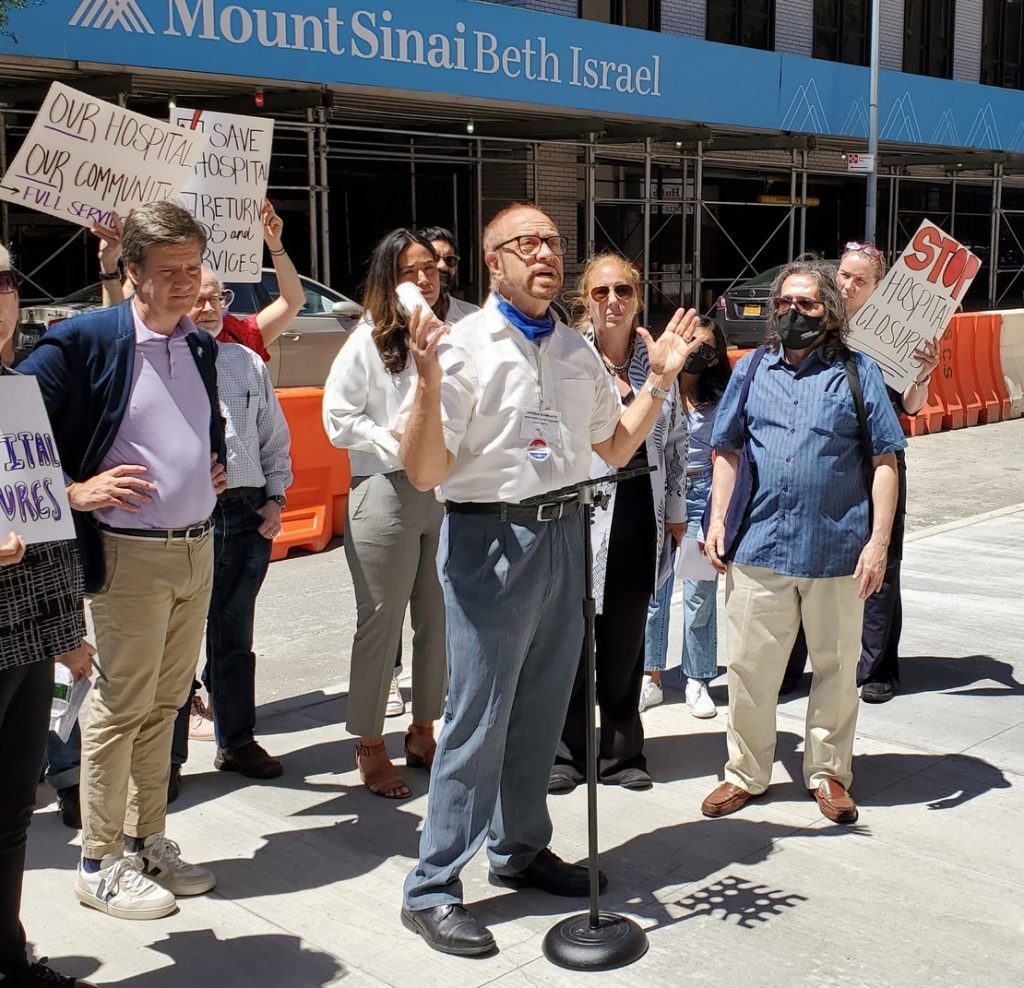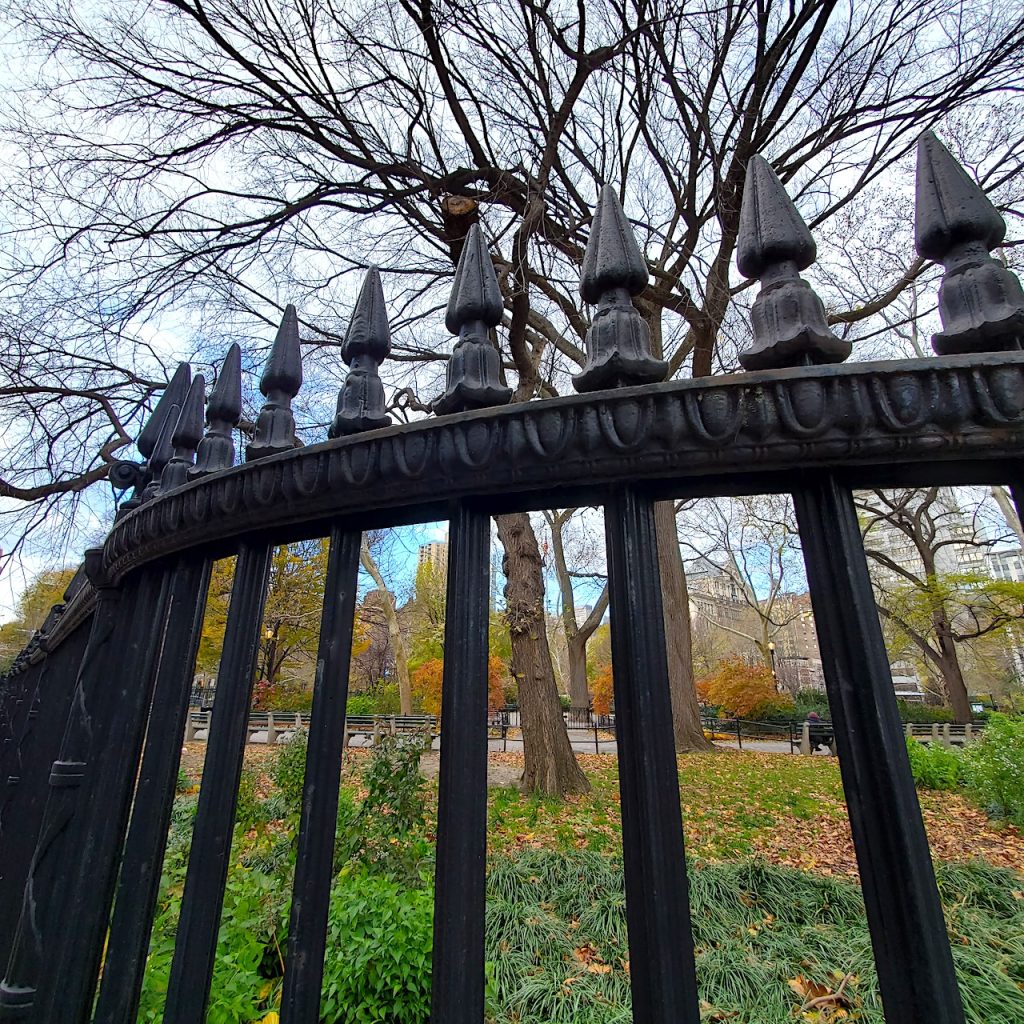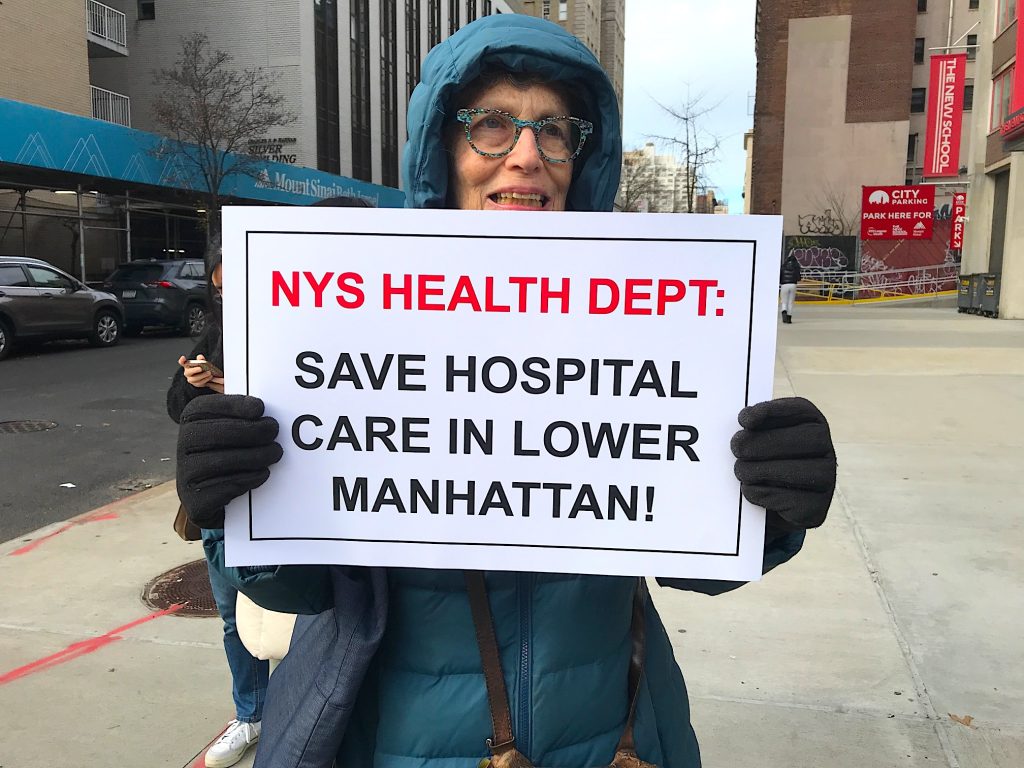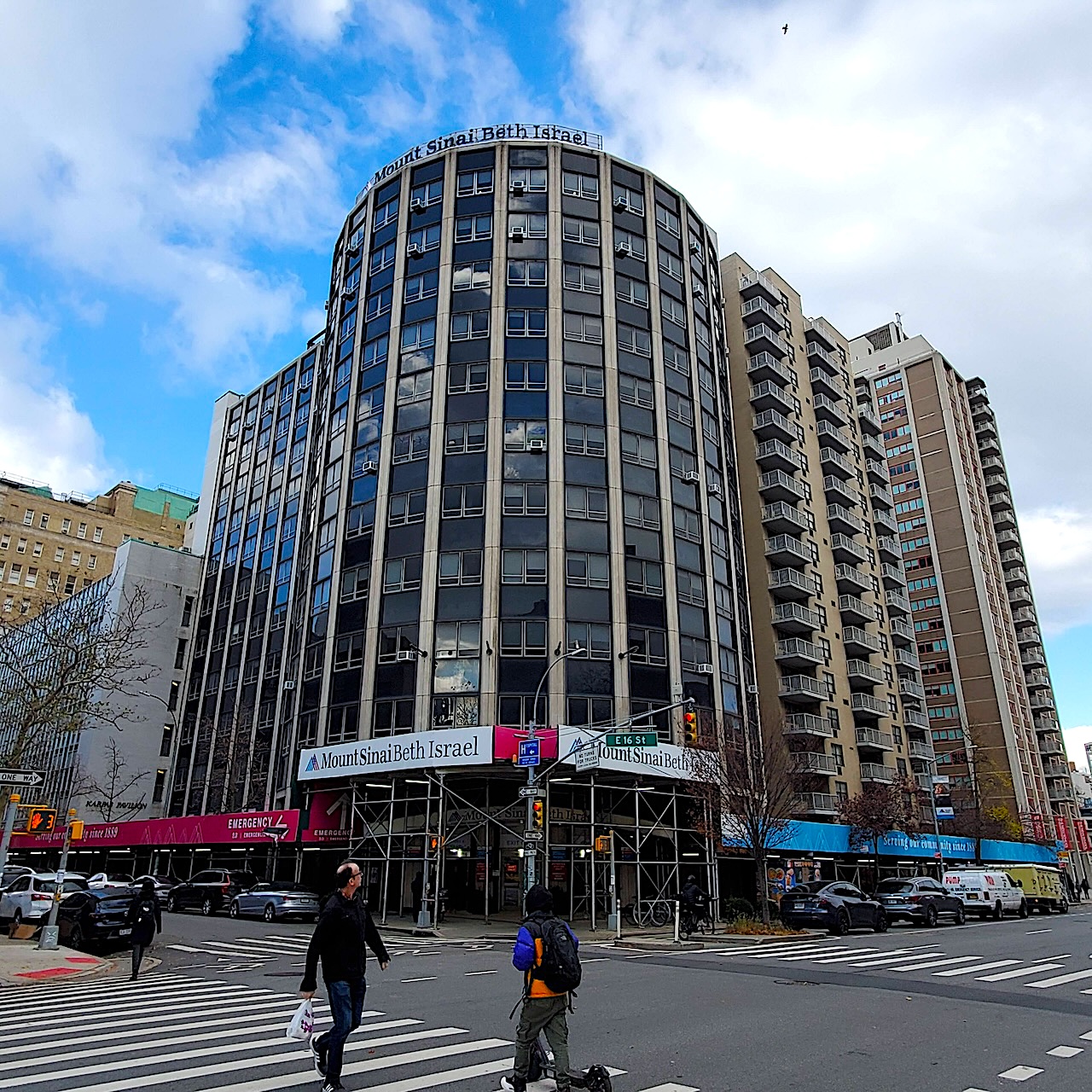BY LINCOLN ANDERSON | “First do no harm”?…
Closing Beth Israel Hospital would be a health disaster for Downtown Manhattan, plus outright illegal, a damning new community lawsuit charges.
And yet, the suit argues, Mount Sinai Health System has been stealthily downsizing the historic Gramercy health hub bit by bit in recent years, in order to skirt getting proper approval from the state Department of Health, which, in turn, actually has been enabling the dubious dismantling.
The lawsuit was filed Feb. 5 in New York State Supreme Court by Greenwich Village activist attorney Arthur Schwartz.
Four days later, Justice Nicholas Moyne granted Schwartz’s request for a temporary restraining order, or “stay,” prohibiting Mount Sinai from closing beds or services at Beth Israel without the court’s approval.
Plaintiffs include, among others, the Community Coalition to Save Beth Israel Hospital and the New York Eye and Ear Infirmary, the 504 Democratic Club (whose members are disabled), Beth Israel patients, a member of Beth Israel’s intensive care unit (anonymously due to fear of retaliation) and Schwartz himself, a former cardiac patient at Beth Israel.
The suit is filed against Beth Israel Hospital, NYEE, Mount Sinai Health System, the New York State Department of Health and James McDonald, the D.O.H. commissioner.

The suit charges that, “There is no way under the New York State Constitution, the [New York State] Public Health Law, or the [Department of Health] regulations that the closure of Beth Israel and its services can be allowed.” The closure also would violate the State Environment Quality Review Act, or SEQRA, the Americans With Disabilities Act and New York State and New York City Human Rights Laws, according to the lawsuit.
In fact, by allowing things already to have reached this point, the suit declares, “D.O.H. and Commissioner McDonald have violated the healthcare guarantees of the N.Y. State Constitution.”
The litigation states that as soon as Mount Sinai purchased Beth Israel, an 800-bed hospital at First Avenue and 16th Street, in 2013, it started moving to “liquidate” it and sell off its valuable real estate. Yet, as of 2015, 25 percent of all Lower Manhattan’s hospital admissions were at Beth Israel, and it had more than 90,000 visits to its emergency room.
Last fall, Mount Sinai abruptly announced it planned to close Beth Israel by this March. Mount Sinai officials claimed the hospital has been losing a massive amount of money every year, and was expected to lose $150 million in 2023. However, the lawsuit argues that both Beth Israel and NYEE “had been profitable and financially viable” until the Mount Sinai takeover. After the purchase, Mount Sinai promptly began shifting services away from both facilities to other parts of the Sinai network, particularly to its flagship Mount Sinai Hospital on the Upper East Side.
Although the Eye and Ear Infirmary has remained profitable despite Mount Sinai’s “service manipulation,” Beth Israel “immediately turned significantly unprofitable and has remained so to the present,” the suit states.
In 2016, Mount Sinai announced a plan to close the Beth Israel campus and build a smaller, 70-bed mini-hospital on part of the NYEE campus, at 13th Street and Second Avenue. But this scheme was later scrapped during the pandemic, when Beth Israel’s full hospital-bed capacity was needed. At the start of the health crisis, Schwartz declared Beth Israel was “warehousing” 600 beds.” Subsequently, for most of 2020 and 2021, the hospital’s beds were being used at “full capacity.” In June 2021, Mount Sinai announced the closure plan was off the table.
According to the lawsuit, Beth Israel’s inpatient admissions increased 16 percent after the closure of St. Vincent’s Hospital in Greenwich Village in 2010, and its emergency room visits increased 12 percent, with Beth Israel absorbing more than half of the defunct St. Vincent’s emergency room patients.
Seeking to block the earlier Beth Israel shutdown plan, Schwartz had argued, in a previous lawsuit, that Mount Sinai was trickily using a “segmented” approach to close the hospital. On the other hand, applying for the Department of Health to approve the full hospital closure would have required a “hard look” at all the potential impacts on the surrounding community’s access to healthcare.
Last October, Mount Sinai submitted to D.O.H. a closure plan for Beth Israel, which is still pending approval.
Meanwhile, the loss of Beth Israel would be devastating for the community’s healthcare, the lawsuit asserts.
“By piecemealing” its drawing down of Beth Israel and doing “department-by-department closures,” the suit charges, “[Mount Sinai] with the clear concurrence of the Health Department, sidestepped all public processes… . And D.O.H. staff, without any meaningful study or public input, has openly already adopted a position that the impact of Beth Israel’s closure would have no negative impact on Lower Manhattan… .”
‘The real estate is very, very valuable. Apparently, this has nothing to do with healthcare.’
— Community Coalition to Save Beth Israel lawsuit
In addition, the suit further contends that other hospitals within the Mount Sinai system also have been losing money — but that Beth Israel is being targeted for closure because of the property’s lucrative value on the real estate market. Beth Israel actually lost not $150 million but $172 million in 2023 (per the lawsuit) — but Mount Sinai’s main campus on the Upper East Side lost nearly $196 million, Mt. Sinai West/Mt. Sinai Morningside lost $122 million, and NYEE lost nearly $25 million.
“So why choose Beth Israel and blame the closure on losses?” the legal petition asks. “Because the real estate on the south end of the Gramercy Park-Stuyvesant Park area is very, very valuable. The decision, apparently, has nothing to do with healthcare.”

Mount Sinai also was very late in announcing a required public hearing for the closing plan, the lawsuit contends — only announcing last Nov. 21 that it planned to hold one a week later at Baruch College.
“No notices [for the hearing] were posted in the hospital,” the suit adds. (Mount Sinai at least did run ads on thevillagesun.com announcing the event.)
At the public forum, Schwartz vocally confronted Mount Sinai Beth Israel C.O.O. Elizabeth Sellman about the hospital already doing service reductions without having yet gotten D.O.H. approval for the closure plan.
“There is nothing we can do,” Sellman countered. “We just don’t have the personnel to operate safely.”
However, the suit notes, the health system “was itself creating those unsafe conditions, by shifting unionized employees to other locations and forcing doctors (who do not have a union) to find new hospitals to work in, given the upcoming termination of services at Beth Israel.”
The lawsuit also notes that last Dec. 18, the New York Fire Department issued a bulletin stating that, as of Dec. 31, Mount Sinai Beth Israel Hospital would be on “permanent diversion” for stroke patients — meaning Fire Department ambulances would no longer transport stroke patients to its E. 16th Street emergency room. However, again, M.S.B.I. had not received permission from D.O.H. to close or de-staff its E.R.
Subsequently, on Dec. 21, state D.O.H. issued a cease-and-desist order, stating, in part, “No closure of beds or services can be implemented without approval from the Department of Health.”
Yet, the lawsuit pointedly notes, “What the Department [of Health] did not do, however, was order the restoration of all services which had been ended or curtailed since the summer of 2023.”
As for three other “area facilities” that could potentially pick up the slack were Beth Israel indeed to shutter — including the hospital’s 70,000 annual E.R. visits — they are already heavily used and lack sufficient capacity, per the suit. Yet, the plaintiffs say, as of the end of this January, M.S.B.I. — in violation of the D.O.H. cease-and-desist order — has been redirecting ambulances to N.Y.U. Langone Hospital and Bellevue Hospital, both located less than 1 mile from M.S.B.I.
“N.Y.U. and Bellevue were unable to absorb the new patients and complained to the D.O.H. about M.S.B.I.’s illegal and dangerous conduct,” the suit states, adding that “since late January 2024, D.O.H. has had officials present at M.S.B.I. to prevent M.S.B.I. from engaging in such illegal and dangerous conduct and overburdening nearby emergency rooms.”
In addition, the closure would violate the Health Equity Assessment Law, the litigation charges. Including M.S.B.I., Lower Manhattan currently has five hospital beds for every 1,000 residents, already the lowest bed-to-resident ratio in Manhattan. The Upper East Side has double that capacity, boasting 10 beds for every 1,000 residents, while Upper Manhattan currently sports six beds for every 1,000 residents.
Two zip codes that are particularly heavily served by M.S.B.I. — 10009, covering the East Village and Stuyvesant Town, and 10002, covering the Lower East Side and part of Chinatown — would be severely impacted by the hospital’s closing.
In 2023, nearly 46 percent of the population requiring inpatient treatment in zip code 10009 (which includes Stuyvesant Town, right across First Avenue from the hospital) used Beth Israel. For zip code 10002, which extends south of Houston Street, 23 percent of residents requiring inpatient treatment used Beth Israel.
According to Census data, almost 23 percent of the population in zip code 10009 live below the poverty line, meaning many rely on Medicaid. Many of these residents live in Housing Authority developments below 14th Street, east of Avenue D. Beth Israel is their closest hospital.
In zip code 10002, more than 26 percent of residents live below the poverty line, with 63 percent of residents being either Asian or Hispanic.
In addition, although they are more affluent areas, Greenwich Village and Soho currently have zero hospital beds for a population of 84,271.
“Clearly,” the lawsuit states, “the Lower East Side, Greenwich Village and Soho are hospital bed deserts. The closest hospital…is Beth Israel.”

Although Bellevue, N.Y.U. Langone and New York-Presbyterian Lower Manhattan Hospital (which is 2.3 miles away from M.S.B.I.) all accept Medicaid for at least some services — the lawsuit notes that only Bellevue, like M.S.B.I., “accepts Medicaid for most services.”
In addition, zip codes 10002 and 10009 have a high percentage of disabled residents (around 13 percent), as well as residents over age 65 (29 percent in 10002 and 21 percent in 10009).
“[Mount Sinai’s] closure of M.S.B.I. and attempted diversion of Lower East Side residents to distant hospitals will have an unjustified negative disparate impact on…protected groups, in violation of the New York State and New York City Human Rights Laws,” the suit states. “The closure, as a matter of law and equity, is unlawful.”
As well as trying to redirect ambulances away from its E.R., Mount Sinai, per the lawsuit, “has put significant pressure on all employees at M.S.B.I. to move to alternative [Mount Sinai] facilities, including having them attend internal job fairs and making it clear their positions at M.S.B.I. will be terminated if they do not relocate. Those employees are terrified to speak out… .”
In another fraying of the area’s healthcare safety net, M.S.B.I. also has slashed its formerly robust Chinese- and Spanish-language services, the suit says.
Despite not yet having received D.O.H. approval for the closure plan, M.S.B.I. had already set up a schedule for moving out services to other Mount Sinai locations.
“M.S.B.I. is pursuing these unapproved service alterations and reductions in plain sight,” the suit charges, “clearly believing that the D.O.H. will approve its unlawful plan, or believing that it is too powerful to be tethered by State Law and Regulations. Such brazen conduct undermines the letter and spirit of the law and plainly jeopardizes the health of 400,000 New Yorkers.”
The lawsuit calls on D.O.H. to deny the application to close Beth Israel; enjoin M.S.B.I. from further services reductions or closure attempts; compel the reopening and proper staffing of parts of Beth Israel that have been closed since 2017; compel the reopening and proper staffing of the hospital’s cardiac surgery unit; and rescind D.O.H. permission for the closing of parts of the New York Eye and Ear Infirmary.
Asked for a response to the lawsuit, Loren Riegelhaupt, a Mount Sinai Health System spokesperson, issued the following statement:
“While we cannot comment on pending litigation, Mount Sinai firmly believes that we have followed the law in this process. Ultimately, the health and safety of our patients has been — and will remain — our top priority and the North Star guiding all of our decisions.
“While we understand and appreciate the concerns that have been raised, the stark reality facing this hospital is immutable. Hospital closures across the nation are a result of significant challenges in healthcare finance and changes in how care is delivered. A hospital with a 70-year-old infrastructure, built in a different era for a different type of care model, simply cannot compete with the dynamic needs of modern healthcare, which relies increasingly on outpatient and specialty services. As a result, the hospital is operating at roughly 20 percent capacity, the infrastructure is crumbling, and it lost an estimated $150 million in 2023 and more than $1 billion since 2013. Any failure to address these losses poses a real threat to the overall Mount Sinai Health System.
“We continue to work diligently with our regulators and local leaders to ensure all patients receive the care they need at the appropriate facility, whether that be at Mount Sinai or an alternate care center. Mount Sinai remains committed to the Downtown community with a robust ambulatory care network and behavioral health offerings throughout the area.”


Great news, altho’ I’m wondering which flavors predominate…
“Clearly,” the lawsuit states, “the Lower East Side, Greenwich Village and Soho are hospital bed desserts. The closest hospital…is Beth Israel.”
The lawsuit is very clear that the two zip codes that would be most decimated by B.I.’s closure would be 10009 and 10002, the East Village and Lower East Side, whose residents overwhelmingly rely on B.I., which takes Medicaid for all services. On top of that, G.V. and Soho and LES are “hospital deserts” — meaning a lack of hospital beds within them.
A friend of mine who had been a longtime patient at the Union Square facility was shuttled to the UES Mt. Sinai campus because “robots” were said to be more precise for the needed procedure. He died after 3 weeks in ICU.
He might have passed anyway. But he was further from his many friends.
Another move in the service of real estate. In this city of “Yes” the captains of commerce ignore humanity.
Well done, Arthur. The truth is out: Beth Israel must remain open.
Good news!